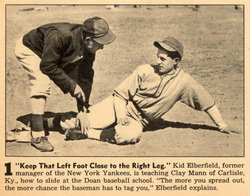
He established himself as a big leaguer with the Tigers in 1901, hitting .308 with 76 RBI in 121 games. Among things longtime Detroit Tigers fans should know is the fact that he was the team's first .300 batter in the history of the franchise. One thing that Elberfeld was known for was his physical abuse on umpires. In spite of hitting .341 through his first 35 games of the 1903 season, an incident which Kid attacked an umpire left the Tigers organization to want to trade him. Elberson was on board, in fact, according to reports, he intentionally botched plays to get himself traded. Manager (and future builder of the early 1920s New York Yankees) Ed Barrow made the accusations. Ironically, Elberfeld was traded to the New York Highlanders, where he spent the next 6 and a half seasons.
Kid was also known as a violent player on the field. In fact, during Cobb's rookie season, Ty came into second base with a head first slide. Elberfeld made sure that he placed his knee right into the side of Cobb's neck. From that point forward, Cobb refused to go into any base head first, generally going in spikes up. While Elberfeld showed his share of aggression, he did have to defend himself against the aggressive baserunning of many who came into second with high spikes. His legs were severely cut up due to the many spikings and he would pour whiskey on his legs to close the wounds. Among things Kid was known for was getting hit by pitches, something he led the league in more than once. In fact, his 25 HBPs in a season stood as the major league record until Don Baylor broke it with 35 in 1986. His 165 HBPs for his career currently rank him 17th all time in MLB history (Chase Utley is just 2 behind and amongs those who rank ahead of him are Derek Jeter, Alex Rodriguez and Carlos Delgado).
While with the Brooklyn Robins organization in the minors, Elberfeld struck a good friendship with a young kid named Casey Stengel. In fact, it was a late 30s Elberfeld who would become a very good influence on Casey. Kid would talk and Casey would listen, absorbing as much as he would for the man. Of course, Casey was later known for what he had to say, so his quietness was just an act. Elberfeld served as a player manager for the Highlanders in the 1908 season when manager Clark Griffith resigned. He led the team for the rest of the season but his dismal .276 winning percentage (27-71) kept him for returning to the bench the following season. After he was done playing in the majors (he played briefly for the Robins in the 1914 season after not playing in the bigs since 1911), he played and managed many more seasons in the minor leagues and signed a SS by the name of Travis Jackson to his first pro contact. He introduced Jackson to New York Giants manager John McGraw, who would use him as his starting SS the following season, the 1924 season which the Giants lost the World Series to the Washington Senators (on a game 7 error by Jackson).
Elberfeld received some consideration for Baseball's Hall of Fame. However, it was more for his impact on others than what he actually did on the field. He was always known as a talent, but never managed to become a complete AL Star. He was so highly thought of, the Philadelphia Phillies decided to sign him instead of future Hall of Famer Honus Wagner.

 RSS Feed
RSS Feed
